The tradition of inaugurating a new president is a fairly new one here at Towson University given our 150 year history. Part of that may be due to the fact that our first leaders were actually considered principals while the school itself was a teachers’ training school – something more akin to a vocational school. The evolution of that institution from training school to college to university is reflected by the changes within the formal induction of its leaders.
The first president of the school that would become Towson University was Lida Lee Tall. She was appointed principal to what was then known as the Maryland State Normal School on August 2, 1920, and was on campus and in the job two weeks later. This change in leadership was heralded by five articles in the Baltimore Sun, and little else.
Eighteen years later, Tall retired from what was then the State Teachers College at Towson (STC), and the day it was announced, her successor was also announced. This time, the Sun offered only one article to cover Tall’s retirement and the appointment of M. Theresa Wiedefeld to the role of president.
In a bit of serendipity, the same page that lists the transition from Tall to Wiedefeld also includes a piece about the new State supervisor of high schools, Earle T. Hawkins. When Wiedefeld retired in 1947, Hawkins would be named the new head of STC.
While Hawkins began his tenure as president in September of 1947, a ceremony was planned for January 1948 to fully inaugurate the new president.
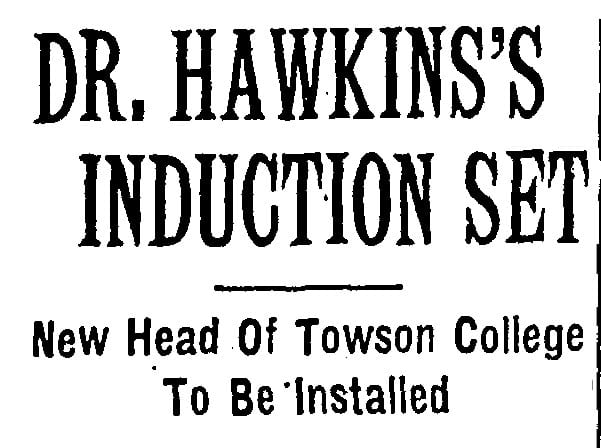
A month later, on January 17, 1948, the State Teachers College at Towson hosted its first ever presidential inauguration.
As these things go, it was a fairly brief ceremony. Beginning at 11am in the Stephens Hall auditorium, Hawkins was inaugurated by Dr. Tasker G. Lowndes, President of the State Board of Education. There were speeches by Dr. Thomas G. Pullen, Superintendent of Schools in Maryland and Dr. Clyde Hill, a professor at Yale which is where Hawkins had earned his doctorate, and the Governor, William Preston Lane. Hawkins’ own inaugural address focused on the role of STC as an institution “to attract worthy people from Maryland high schools and send back alert, enthusiastic, worthy teachers.”
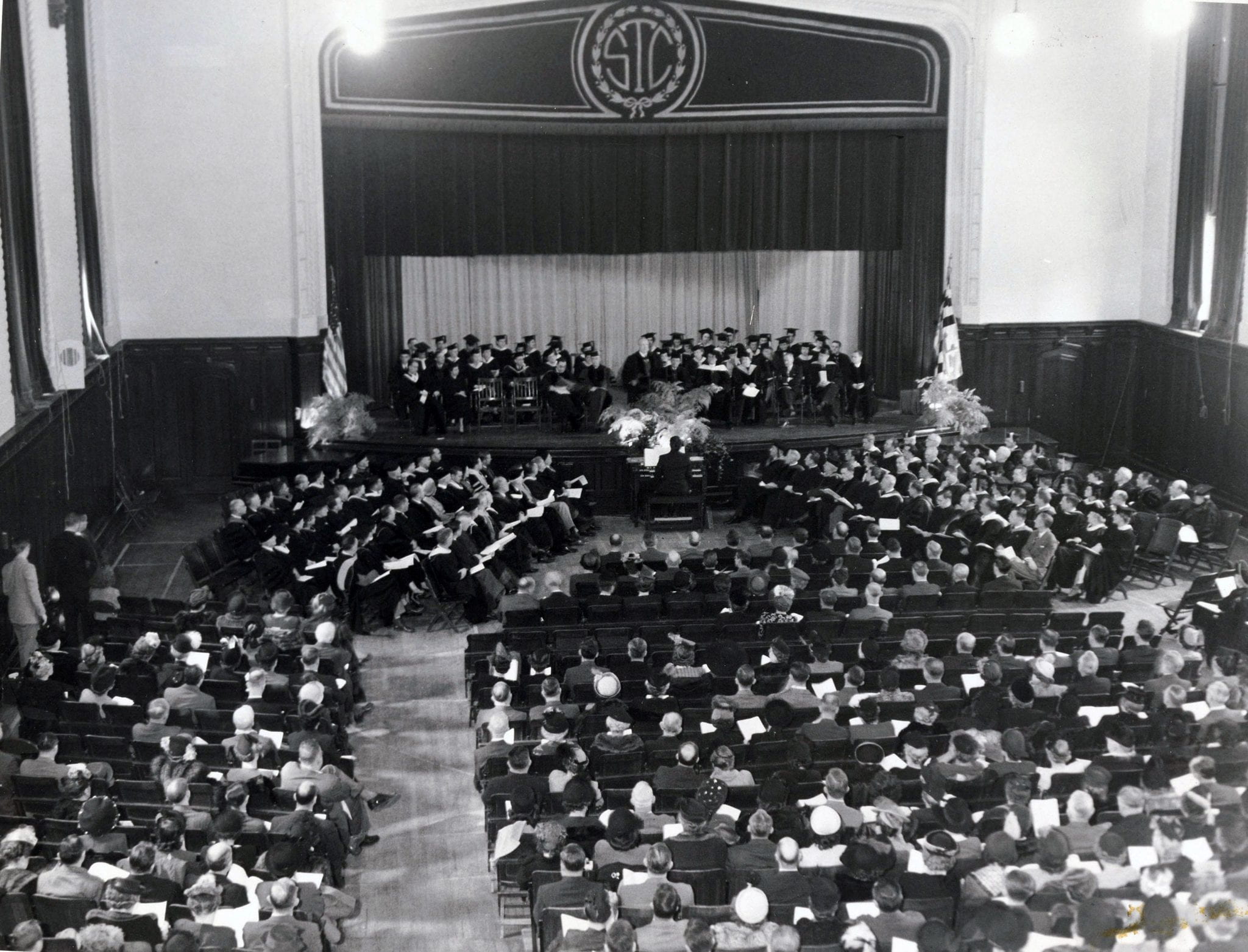
The Sun reported on December 18th that “Many colleges and universities in the East as well as Government officials and educational leaders in Maryland are expected to be present.”
After the ceremony, there was a reception for special guests in Hawkins’ office in Stephens Hall and a luncheon for 600 guests in the Newell Dining Hall.
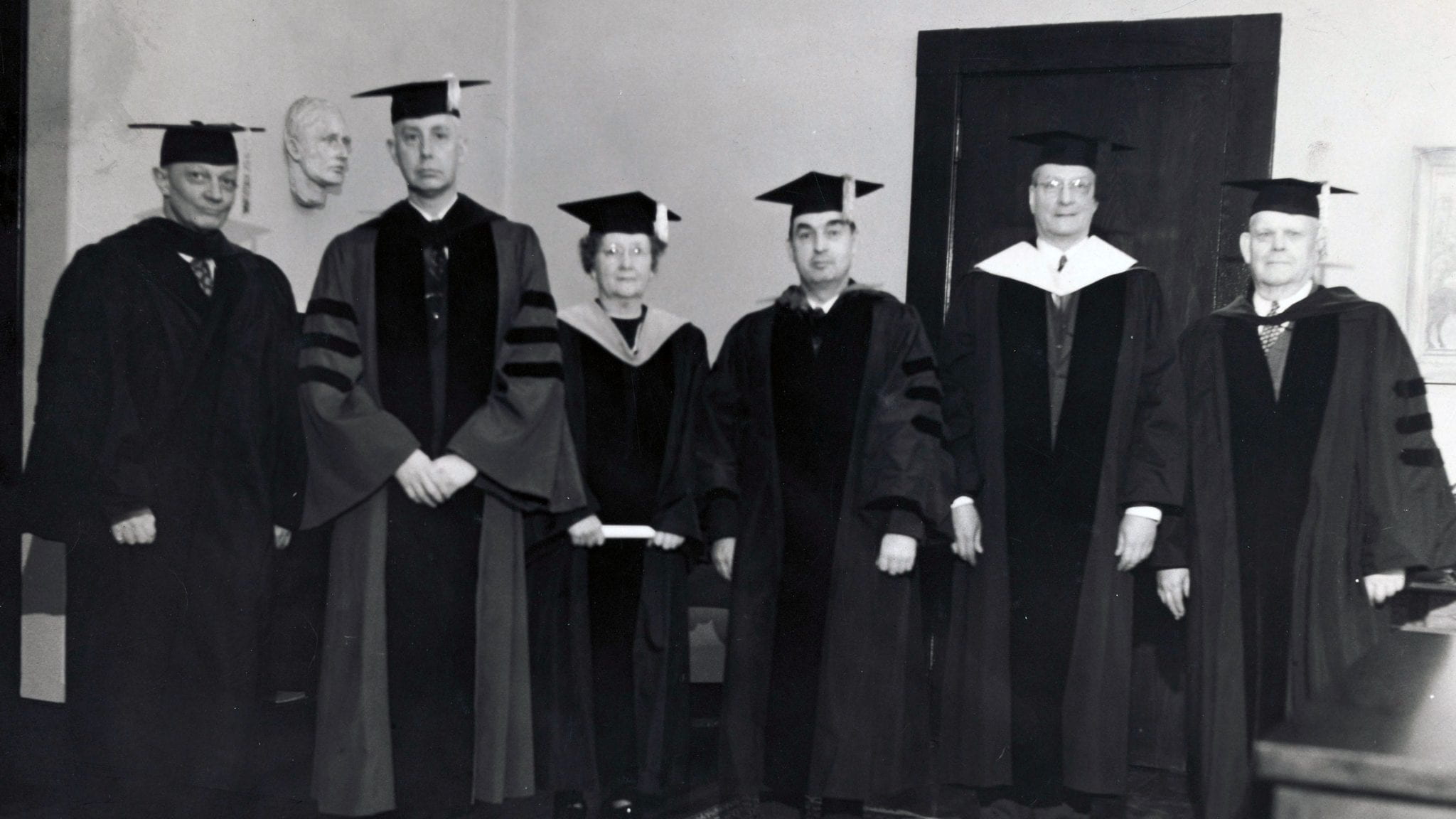
Hawkins was president at STC through the 1960s, even as the school transitioned to a liberal arts college and became Towson State College in 1963.
When his successor, James L. Fisher took the helm in the fall of 1969, he waited until the following spring to celebrate his inauguration as part of the commencement exercises for that year.
At that time, commencement ceremonies were held off-campus at the Baltimore Civic Center because the student population had outstripped the campus facilities. It was reported that 8,000 people attended that day’s activities.
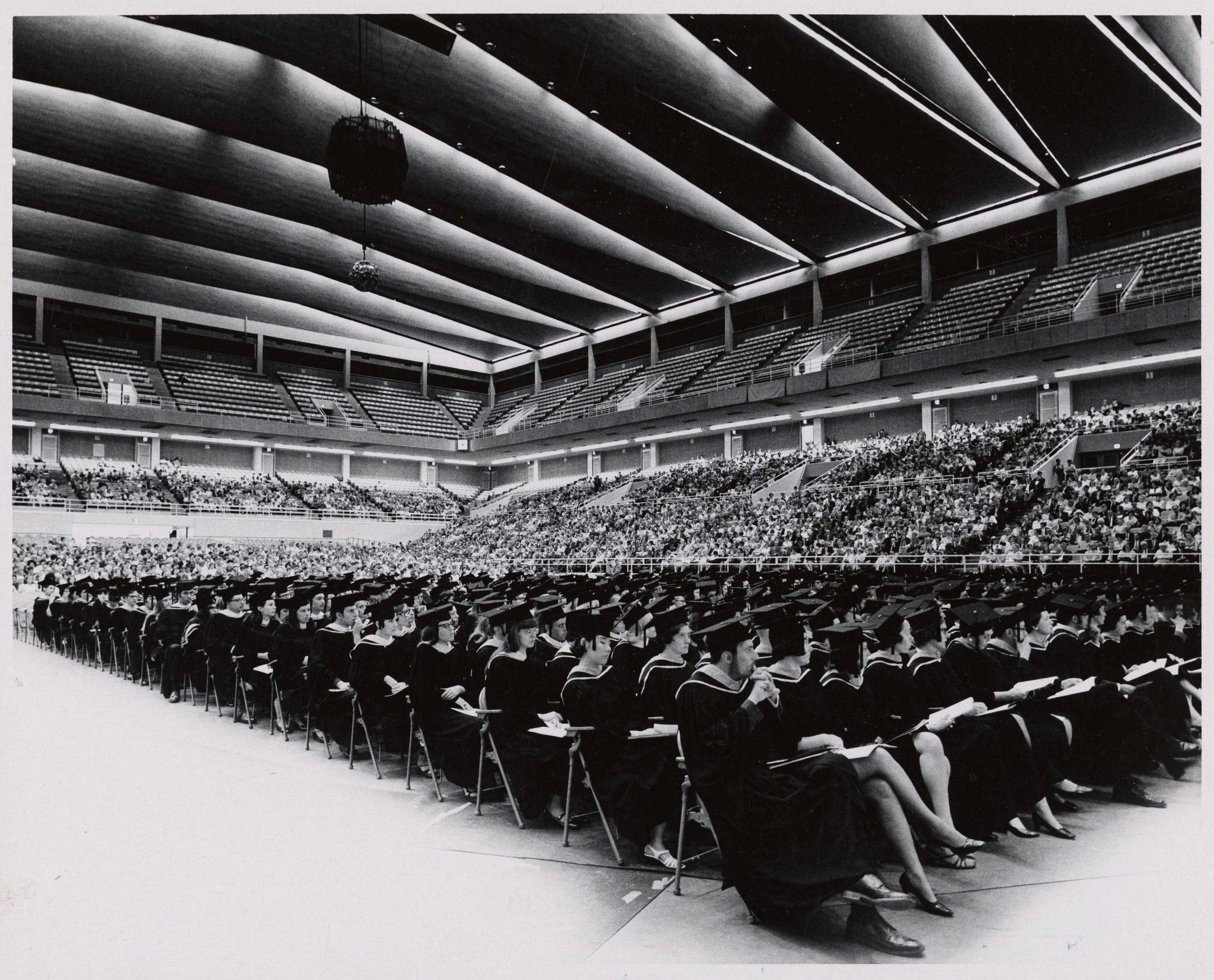
Fisher’s inaugural address was also a charge to those graduating that day.
“We stand on the dawn of a new day,” he told them. “If we will but live to the best of our minds, our emotions, and our morals — if we will become a people who will take charge of our potential, a people who will refuse to believe that the unfair, hypocritical, and unjust malpractices of our society are the essential heritage of the past — we will become a people who find joy and accomplishment in the capacity for change, a people who are determined to use our monumental resources and abilities in service to one another.”

While Fisher was succeeded by Hoke Smith in 1979, Smith chose not to be inaugurated. In a 2002 Towerlight article, Smith explained his reasons for skipping the ceremony: “It was a bad economic time. I didn’t feel like the community needed [an inauguration] when I came [to Towson] . . . I took a quieter approach.”
It would be another thirty-two years before Towson saw another Presidential inauguration, and the difference between Fisher’s and the inauguration of Mark L. Perkins in 2002 was striking — and would add to the growing concern about Perkins as president.
The inauguration itself was scheduled for a Friday morning, but the celebrations started the Monday before.
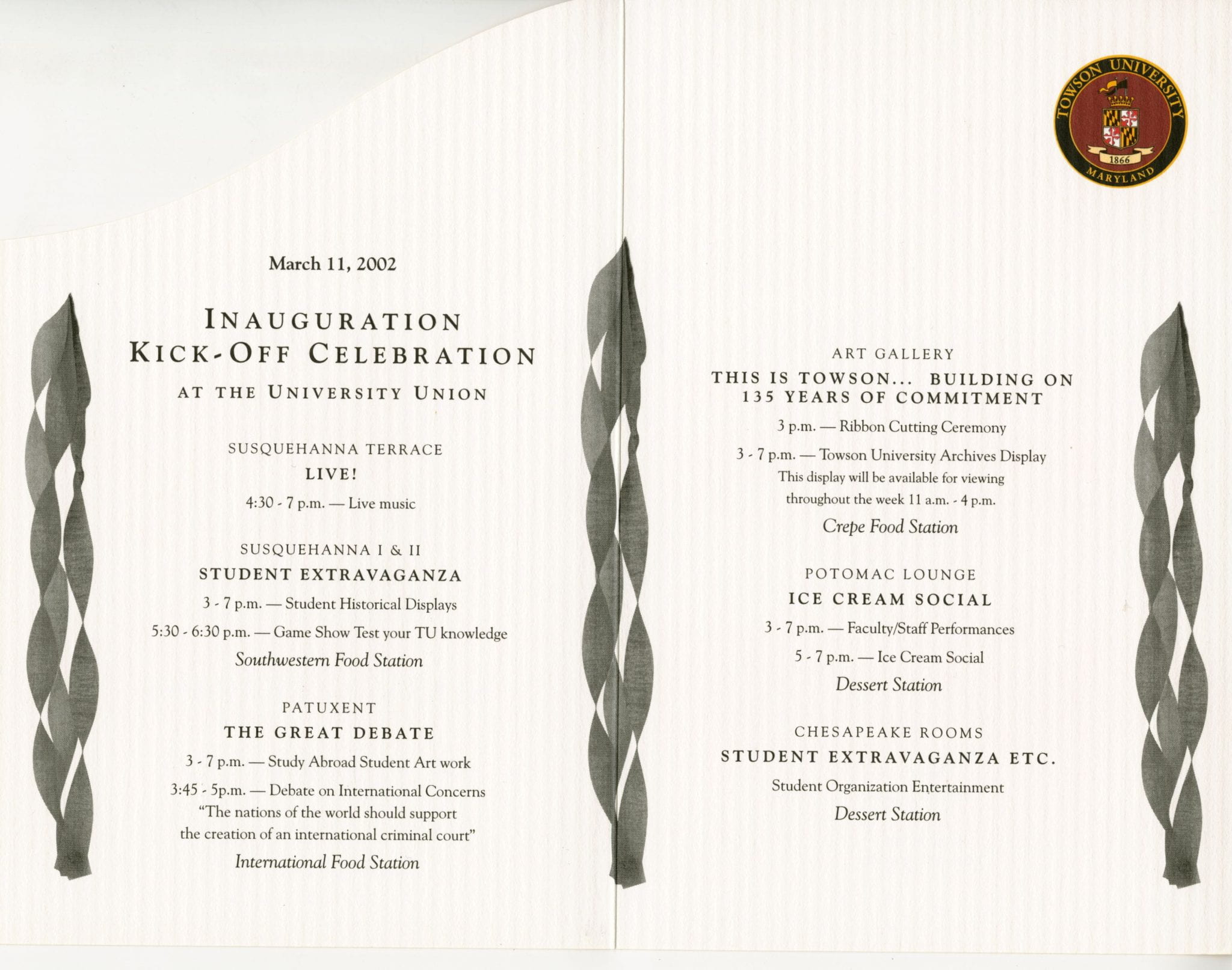
The inauguration was held in the Towson Center and began with “a processional of international students bearing the flags of 106 countries, covering everywhere from Afghanistan to Zimbabwe.”
Eighteen speakers were on-hand for the two and a half hour event, including the University System of Maryland Chancellor, Donald N. Langenberg, and Maryland Governor Parris Glendening. Former Towson Presidents James Fisher and Hoke Smith were included in the ceremony itself, placing a medallion created for Towson by an alumnus, Wayne Werner.
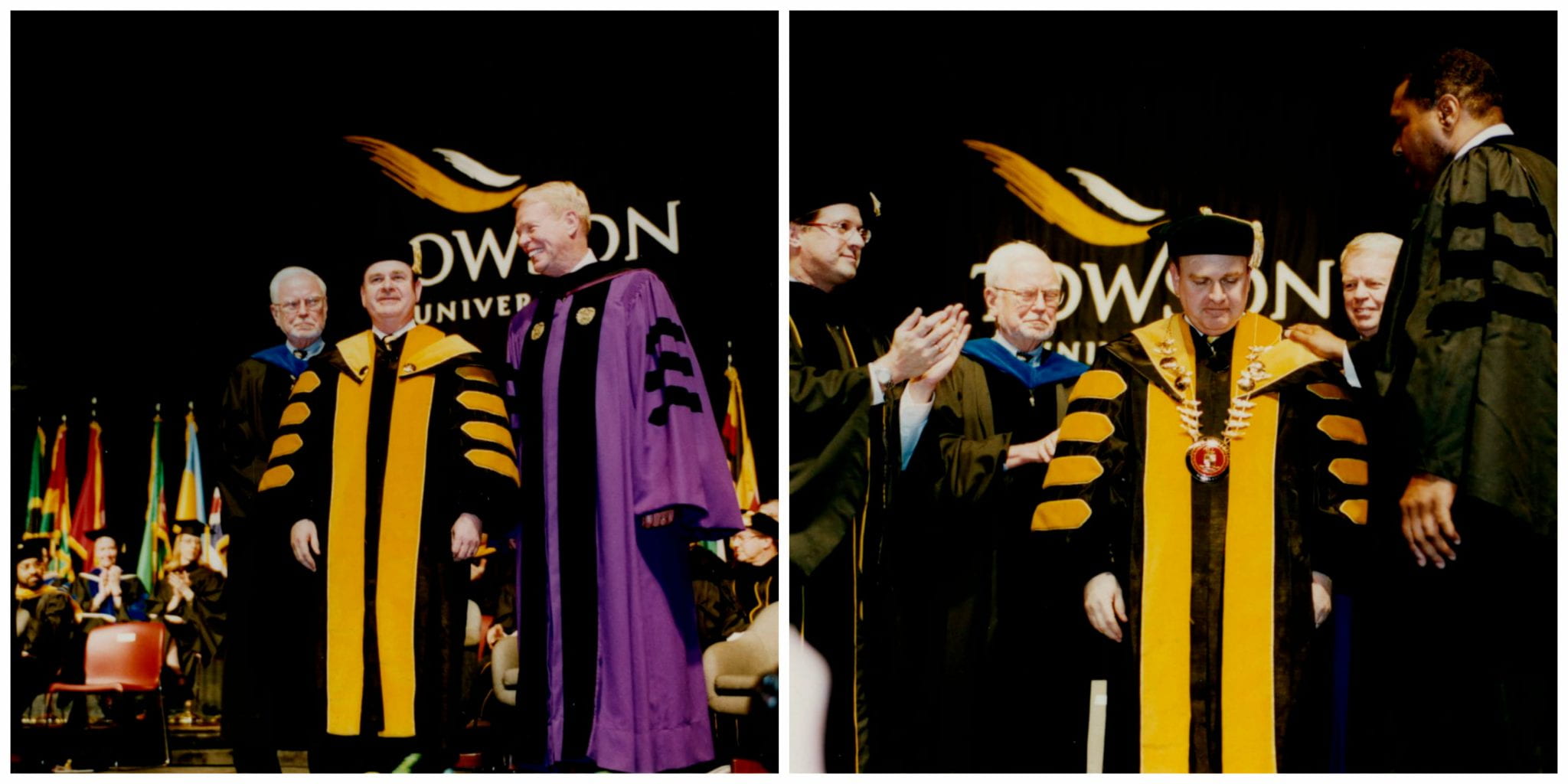
While celebrations continued, groups on campus protested the expense of the inauguration itself, while other students expressed disappointment that not more people attended the event. “It was exciting, although I wish there were more people,” Maya Ahmad told the Towerlight.
Ultimately, the controversies caught up with Perkins and the Board of Regents asked for his resignation, barely a month after the inauguration.
It was a lesson succeeding Presidents took to heart.
Robert Caret, former professor, dean, and provost at Towson, returned in the fall of 2003 to take over the role of President after Perkins’ resignation. On November 7th, about 500 people gathered once again at the Towson Center for the ceremony. High profile guests included US Senator Paul Sarbanes and Ben Cardin who was at that point serving in the US Congress.
Susanna Craine, Towson’s spokesperson, told the Towerlight that the ceremony would be shorter and not as lavish as Perkins’ inauguration had been. “It took forever,” she said. “This will be lovely and it will be impressive because it’s in academic regalia, but I think it will be a better length for everyone.”
As for the medallion, Caret told the Baltimore Sun that he would wear it. “We can either sell it at a big loss on eBay or use it,” he said. He did, however, change out the chain.”
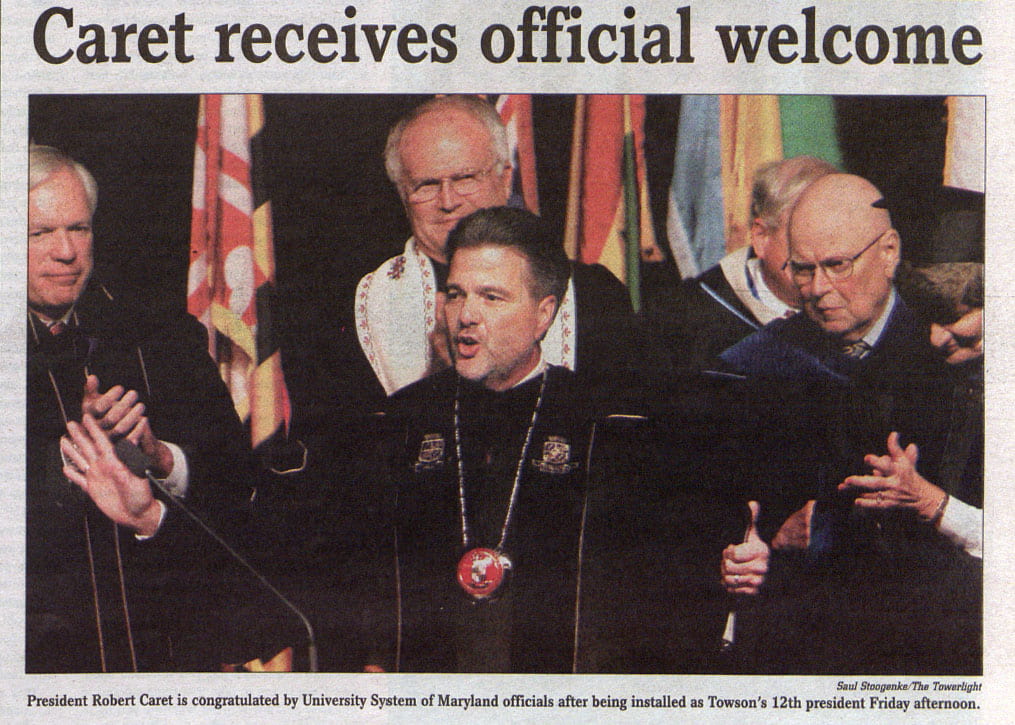
The inauguration was broadcast online, which was not a surprising advancement for Caret who was a big proponent of technological innovations during his time as Dean of the College of Natural and Mathematical Sciences, now known as the Fisher College of Science and Math, and as Provost.
In his address, Caret asked his listeners to think about how their work would impact future generations of Towson University students. “The decisions we make and the changes we make will create the Towson of 50 years from now.”
The inauguration of our 13th school leader and 8th President, Maravene Loeschke, took place on September 14, 2012. Like Caret, Loeschke was a former professor and dean, but she was also an alumna, and her return as President became a kind of homecoming.
Many campus events were scheduled to be included in the inaugural celebrations. The kick-off event was a performance of the play “Love Letters” by Loeschke and her husband, founder of Towson’s Theatre Department, Dick Gillespie.

And echoing the procession of flags from Perkins’ inauguration, Loeschke dedicated a new International Walkway. Flagpoles line the path between the College of Liberal Arts and Psychology building, flying flags that represent the home countries of our international students.
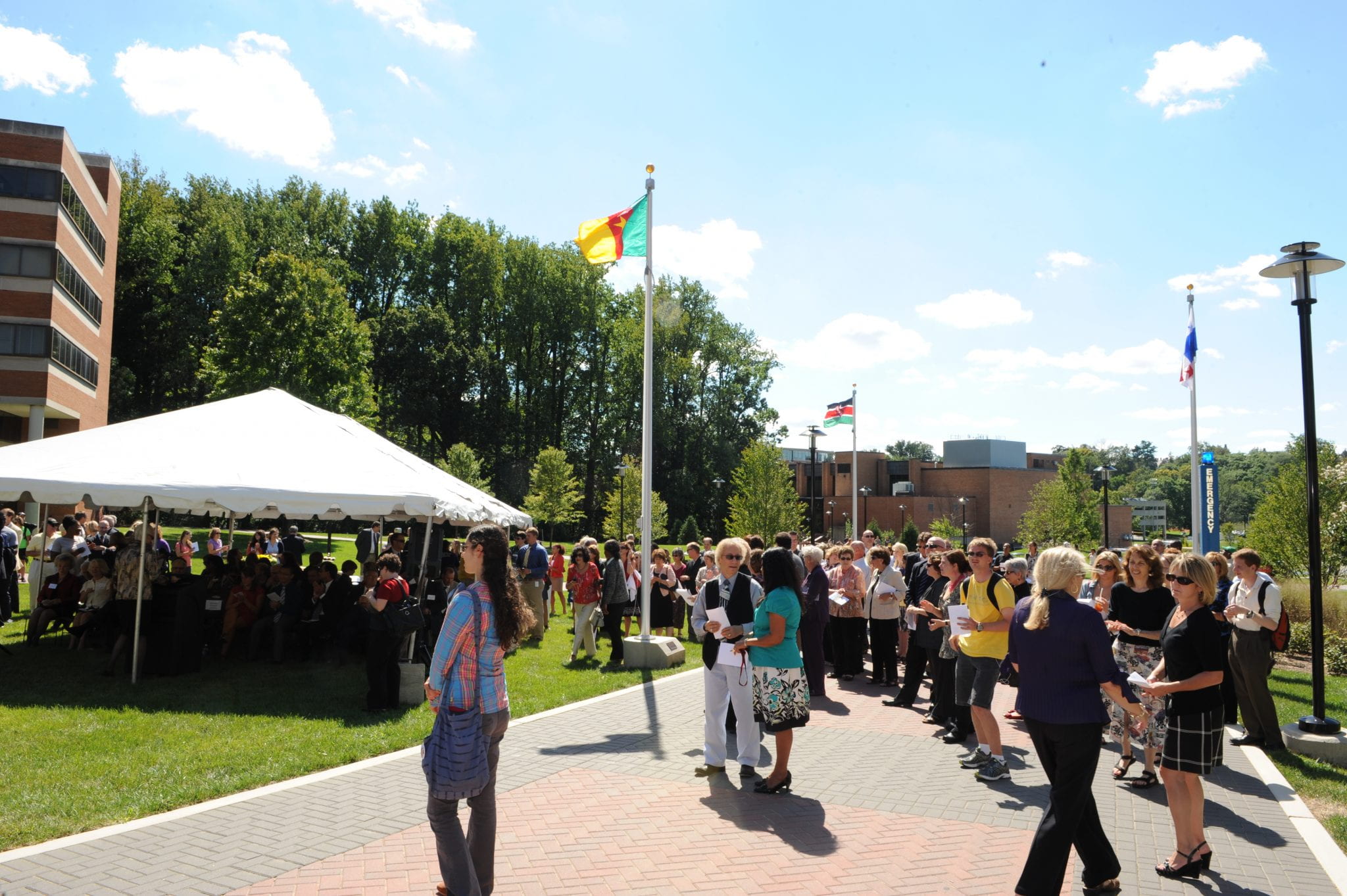
On September 14th, 2012, Loeschke’s inauguration was held in the Towson Center. Guests included former TU Presidents Robert Caret and James Fisher, and Maryland Senators Barbara Mikulski and Ben Cardin.
Loeschke’s vision for her work at the University and for the students was based on service to the community. During her address, she said “Peace, leadership and service are a trinity in which our world’s society exist, and that process exists within each one of us. One action, one sacrifice at a time, let us work together to carry this magnificent University into the future.”
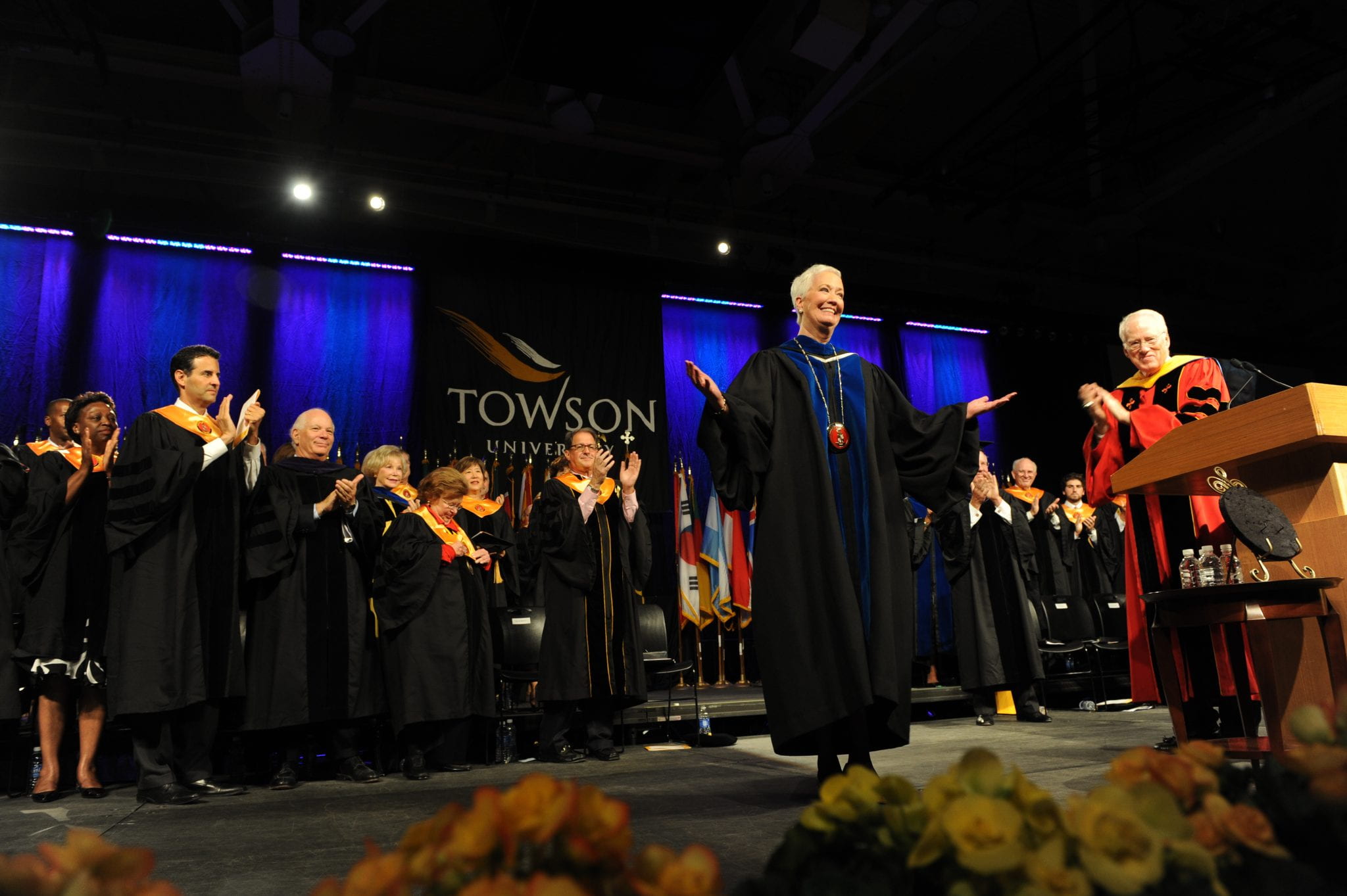
On September 16, 2016, Towson University will inaugurate its 14th leader and 9th President, Kim Schatzel. A full week of events is planned to celebrate the occasion.
As reported by Towson University, Schatzel sees that was has come before is key:
“I look at this as a celebration of the 150-year history of Towson University and looking ahead at the next 150 years,” Schatzel said of the upcoming inauguration. “It is a celebration of the university, its many contributions to Maryland, and its people.”
